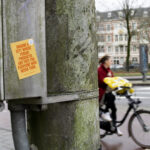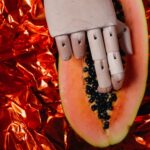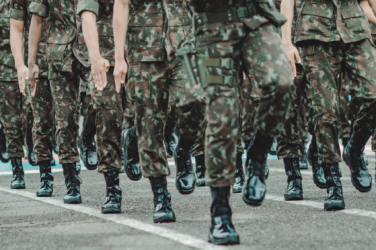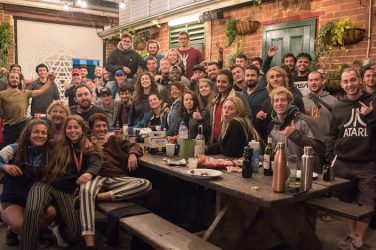Period poverty can sound like an abstract term, something that does not happen to people you know, to students in supposedly wealthy and progressive cities, like Amsterdam. Unfortunately, it is a fact that almost a third of people who menstruate experienced period poverty in Amsterdam over the past year. But what does period poverty even mean? And how can we improve the situation? E&M-Author Antonia Frank talked to Tammy Sheldon from the Neighborhood Feminists, an Amsterdam-based foundation fighting period poverty.
To understand what the Neighborhood Feminists do and why, Tammy told me how their journey began:
‘I’m one of three co-founders of Neighborhood Feminists, which is a foundation that’s based in Amsterdam and that’s been actively supporting people locally since 2019. We got together because we wanted to find a way to make a concrete difference in our own neighborhoods, and in ways that would be in keeping with our own intersectional feminist and anti racist ideals. So looking around, when we first started, we fairly quickly understood the real unmet need, and issues around period poverty. And, because that’s kind of our main focus, maybe I should just quickly define that.
Period poverty quite simply is the inability to access or have a lack of access, lack of regular access to period products, but also the information that’s essential for maintaining good menstrual health.
So once we saw the scale of this issue, that became our primary goal, and what we do, as Neighborhood Feminists, is direct action, which means providing period products to some of the people most in need. Right now, we are supporting over 800 people every month. And the other aspect of what we do is working directly with the city and policymakers to advocate for longer term, real, sustainable solutions to this, which is a matter of public health, gender equity, and also just basic human dignity.’
Advocacy in Amsterdam
A few weeks ago, the city council of Amsterdam passed a proposal to tackle period poverty and ensure that all citizens’ menstrual health needs are met, starting with the most disadvantaged groups. While there is already a pilot project, the budget for this larger initiative is not set yet and will only be decided at the end of the year. Nevertheless, this proposal is a crucial first step, and very visible progress from when the Neighborhood Feminists first began advocating for menstrual health in 2019 and were mostly met with disinterest.
However, period poverty cannot fully be solved at the local level because for a lasting eradication of period poverty, policy makers must address root causes of poverty itself.
‘One of the things that we say is that there has to be a combination of elements, and one of them is that we strongly believe one of them is that the minimum wage has to be increased. And that happens at the national level. So that’s got to be part of the solution.’
The Landscape of Period Poverty
In 2022, the Neighborhood Feminists conducted a survey on period poverty to determine the scope of the problem here in Amsterdam and make it clear to policy makers in the form of quantitative data. The results show the severity, but also the complexity of the problem.
27% of people who menstruate have been unable to afford the period products they need at some point over the last year in Amsterdam. Among 12 to 17 year-olds, this number rises to a startling 70%.
Tammy was able to give some context on why that is the case: ‘When you’re talking about this kind of percentage, it is very, very high, but it is also due to the fact that you’re looking at a high number of kids who are living in homes that are already financially strapped. They’re seeing parents who are having to make some hard decisions about what they do and don’t buy, and they don’t particularly want to add to that strain.
I think another part of it is shame. And one of the things that the period poverty initiative is calling for is better menstrual health education in schools, education that’s also very practical. The persistence of that shame also makes it hard for young people to speak up. And the consequences mean missed opportunities, whether academic or social, because they’re staying home, because they don’t have enough of the products they need. If it’s a heavy flow day or whatever, and they don’t feel secure enough that they’re going to make it through the day with what they have, they stay home and they miss out, and that has impacts also on health and your own personal sense of well being.
I think what people underestimate is that not only period poverty, but poverty itself are sometimes just hiding in plain sight. So some of your classmates are experiencing period poverty, and they may not even realize it.
I was recently talking with some students at the Vrije Universiteit in Amsterdam. And one of them said that it took taking our survey for her to figure out that she actually experiences period poverty. Because period poverty is not only ‘oh my god, I never have any pads’, it means sometimes having to make difficult choices, to buy fewer groceries or to miss out on an event or whatever. That still qualifies as your life being impacted, because you’re unable to easily access a healthy menstruation.’
The intersection between homelessness, undocumented migration and period poverty
‘The fact of the matter is, there are a whole heck of a lot of undocumented people in Amsterdam. And undocumented and homeless people are not tracked by the city census data. They are looking at very dire situations where they don’t have access to what they need. Many of them just made long, high-risk journeys, some of which involved a large degree of not only fear, but actually physical trauma as well, which absolutely affects all aspects of their health, including their menstrual health.
When we [as NF] started out, we were little, we were doing this in our living rooms, and we had stacks of pads in our hallways, and we were delivering them. But we started, we tried to figure out who were the most at risk people. And that comes down to undocumented people and homeless people. And so for them, we started a project called Dignity Kits. And these are basically toiletry kits that we put together with enough hygiene products for around four weeks: toothbrush, soap, shampoo, basic stuff like that, together with period products. And we’ve been distributing those since. Now, with the promising developments that are happening at a city level, we’re now phasing out of those Dignity Kits. But we’re continuing to support those refugees at all those locations, by continuing to provide period products. Because what we know is that in addition to that trauma once they arrive here, and I don’t know if everybody knows this, but they’re legally in this country not allowed to work in any way. Some of them have some access to state support. But what does that mean?
That boils down to about 57 euros per week, they have to pay for everything for that. And if you’re talking about a refugee mother, for example, who is forced to make a choice between feeding her child or getting some period products for herself, that decision is pretty easily made.
57 euros is just not enough. And if the products are provided, you have to jump through hoops and may go through some humiliating processes. So a refugee who menstruates can find themselves in a position of having to go to, you know, a male coordinator standing at the desk, and say, okay, I need some period products, and that person says to them, um, how many do you need, and that person, there’s this sort of humiliation.
I’m mentioning this because this is something that an undocumented person who participated with me in an event in January talked about: that sense of shame of not wanting to acknowledge how many pads you might need, because somehow, you know, heavier flow is embarrassing, and then having to speak to someone like this sort of adds insult to injury. So yeah, I think that the damage happens in a lot of small ways. And processes like this kind of perpetuate that sense of vulnerability and risk, which is really unacceptable. That’s why we focused first on refugees, because we saw a clear larger unmet need there.’
Cover Image by Neighborhood Feminists











Show Comments
🌍 Hello World! https://national-team.top/go/hezwgobsmq5dinbw?hs=7a8723f0e2ae84997f303142f44691e9 🌍
jmll81
Comments are closed.